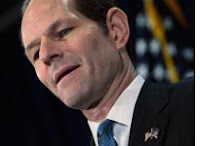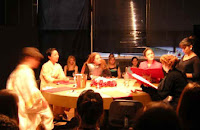 Well, speakin’ of reproduction! This just in via Elaine Tyler May, who currently teaches at the University of Minnesota and was twelve years old in 1960 when the Pill was approved by the FDA. Although not yet old enough back then for the event to have had any personal significance for her, she was already interested in the subject because her father was one of the clinical researchers who helped develop the Pill, and her mother was a founder of free birth control clinics in Los Angeles. She’s now doing research for a book and asks that this query be passed around widely. Please pass it on!
Well, speakin’ of reproduction! This just in via Elaine Tyler May, who currently teaches at the University of Minnesota and was twelve years old in 1960 when the Pill was approved by the FDA. Although not yet old enough back then for the event to have had any personal significance for her, she was already interested in the subject because her father was one of the clinical researchers who helped develop the Pill, and her mother was a founder of free birth control clinics in Los Angeles. She’s now doing research for a book and asks that this query be passed around widely. Please pass it on!
To learn more about Elaine and her oevre–which includes the groundbreaking book Homeward Bound: American Families in the Cold War Era—click here.
Dear Friends (and friends of friends…),
The Pill is often considered one of the most important innovations of the twentieth century. As I investigate this claim for a new book—set for release on the 50th anniversary of the Pill’s FDA approval (Basic Books, 2010)—I’m looking to include the voices and stories of real people. I hope yours will be one of them. I’m eager to hear from men as well as women, of all ages and backgrounds.
Have you or any of your partners taken the Pill? Why or why not? How did it work for you—physically, emotionally, and ethically? How has it compared with other contraceptive methods you or your partners have used?
· What has been the impact of the Pill on your sex life, relationships, political or social attitudes, and beliefs about the medical or pharmaceutical establishments?
· Do you have opinions about public policies related to access, availability, approval or limitations on the development and distribution of the Pill and related contraceptive products (the patch, the “morning after pill,†long-term injections, etc.).
· Anything else you think I should know?
Send me your most richly detailed answers to any and all of these questions (and don’t forget to include your age, gender, where you live, occupation, ethnic/religious/racial background, sexual orientation, marital status, political party affiliation, or any other biographical info you think is important). If you would like to participate in my study but would prefer to respond to a questionnaire, please let me know and I will happily send you one.
I’m interested in hearing from men and women who have used the Pill and those who have not, those who used it briefly or a long time ago, or who use it now. I am also eager to hear from people who work in fields that relate to the use and availability of the Pill (such as medicine, public health, social work, education, etc.). You will remain anonymous. I will use your contact information only to respond to you directly and to let you know when the book will be available for purchase (at a discount to contributors!).
And just one more thing. I not only want to hear your voice, but the voices of those you love, teach, preach to, learn from, and work with.
Please pass this request on! The more responses I receive, and the greater the diversity of respondents, the more the book will reflect the wide range of experiences and attitudes that have shaped the Pill’s history over the last half century. I hope to hear from you. Please write to me at elainetylermay@gmail.com.
Thanks very much! Elaine Tyler May
 So Philip Weiss recently “reported” in New York Magazine on the secret lives of married men. And the gals at Slate’s XX Factor blog responded, calling the piece “not an outré confession but a fiftysomething baby boomer’s long-winded attempt to rationalize his desire to screw a variety of women despite being married.” I concur. Though Weiss’ article presents itself as provocative and edgy, the piece is inflected with the naïve, wishful rhetoric of 1970s thinking about sex. Here’s the XXers’ take:
So Philip Weiss recently “reported” in New York Magazine on the secret lives of married men. And the gals at Slate’s XX Factor blog responded, calling the piece “not an outré confession but a fiftysomething baby boomer’s long-winded attempt to rationalize his desire to screw a variety of women despite being married.” I concur. Though Weiss’ article presents itself as provocative and edgy, the piece is inflected with the naïve, wishful rhetoric of 1970s thinking about sex. Here’s the XXers’ take:








